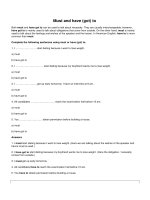Have to and have got to
Bạn đang xem bản rút gọn của tài liệu. Xem và tải ngay bản đầy đủ của tài liệu tại đây (11.79 KB, 1 trang )
Have to and have got to
The structure have (got) to is used to talk about obligation. It has a similar meaning to must.
I have got to get up early tomorrow. (= I must get up early tomorrow.)
I have got to meet him.
I have got to go now.
Have got to can also be used to show certainty. This usage is very common in American English.
I don’t believe this. You have to be joking. / You have got to be joking. (= You must be joking.)
In this structure questions and negatives can be made with or without do.
I have to see him. / I have got to see him.
Do you have to see him? / Have you got to see him?
No, I don’t have to see him. / No, I haven’t got to see him.
We do not usually use have got to to talk about repeated obligation.
I usually have to get up early in the morning. (NOT I usually have got to get up early in the morning.)
Future obligation
To talk about future obligations that already exist, we can use have to or have got to. To talk about a purely
future obligation, we use will have to.
I have got to see him tomorrow. (The obligation already exists.)
One day everybody will have to get permission to buy a vehicle.
Stay on top of your writing! Download our grammar guide from www.englishgrammar.org to stay up-to-date.
Powered by TCPDF (www.tcpdf.org)









